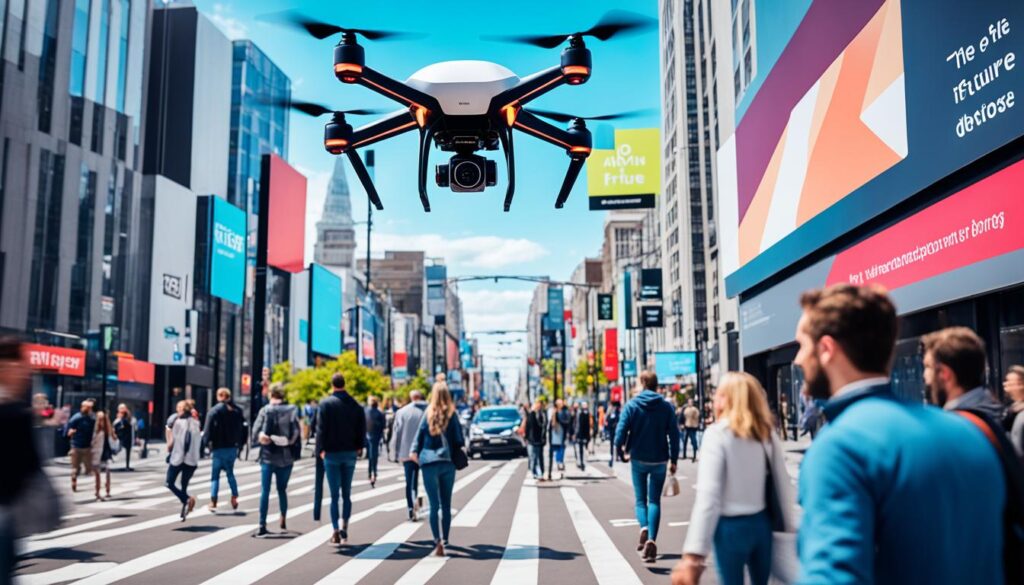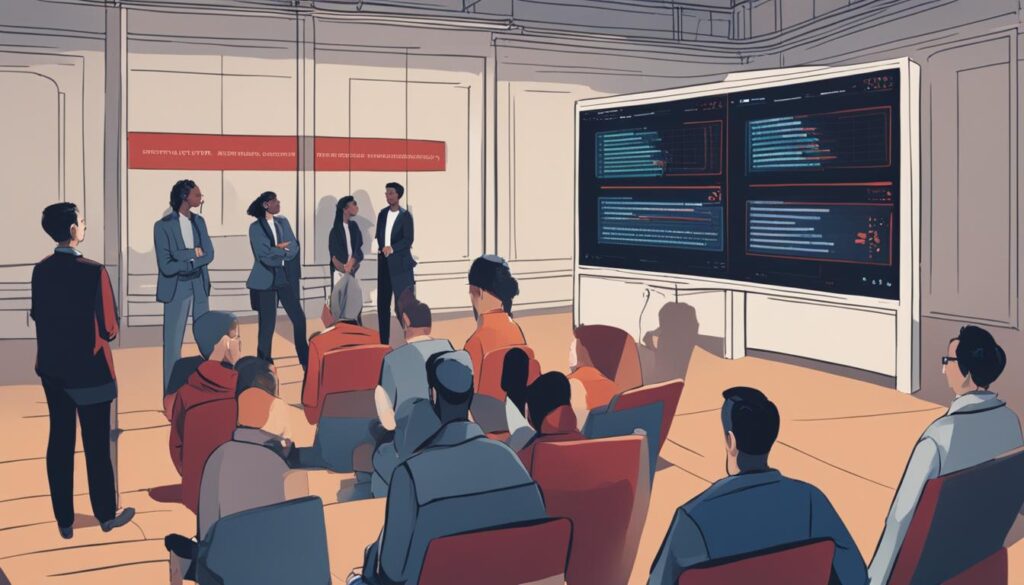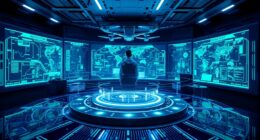Did you know that artificial intelligence (AI) has the potential to completely transform society and significantly impact our daily lives? The impact of AI on human existence is vast and varied, influencing various aspects of our day-to-day routines.
From the way we interact with technology to the decisions we make and the jobs we have, AI plays a significant role in shaping our future. The effects of AI on people and society encompass both positive and negative aspects, raising important questions about ethics, privacy, and the future of work.
Key Takeaways:
- AI has the potential to revolutionize society and bring about numerous benefits, such as increased efficiency and improved decision-making.
- However, there are concerns about the loss of human decision-making, privacy issues, and ethical considerations.
- Understanding and managing the impact of AI on humanity is crucial as it continues to advance and become more prevalent in our daily lives.
- AI’s influence extends to relationships, jobs, healthcare, education, and society as a whole.
- It is important to strike a balance between leveraging the potential of AI and addressing the challenges and risks associated with its development and deployment.
Advantages of AI in Relationships
AI technology has revolutionized our approach to relationships, offering a range of benefits and possibilities. Let’s explore how artificial intelligence (AI) can help us form and maintain meaningful connections, enhance our understanding of human behavior, and shape the future of human interaction.
One of the key advantages of AI in relationships is the emergence of virtual assistants and chatbots that provide companionship and emotional support. These AI-powered entities are available 24/7 to engage in conversations, offer advice, and lend a listening ear. They can help alleviate feelings of loneliness and serve as sources of comfort and understanding.
Furthermore, AI has made its way into the dating scene, with AI-powered dating apps matching individuals based on compatibility algorithms. These sophisticated algorithms analyze vast amounts of data, including preferences, interests, and personality traits, to optimize the process of finding compatible partners. As a result, AI has streamlined the dating process, helping us save time and increasing the chances of finding a meaningful connection.
Artificial intelligence also excels in its ability to analyze and interpret data from social media and communication channels. By analyzing patterns and trends in human behavior, AI can provide valuable insights into our interactions and relationships. This analysis can enhance our understanding of ourselves and others, allowing us to improve our interpersonal skills and deepen our connections.
Image:

“AI technology has the potential to positively transform the way we navigate relationships, providing companionship, optimizing the dating process, and deepening our understanding of human behavior.”
As our reliance on AI continues to grow, so does its influence on our behavior and interactions. AI has the potential to shape the future of relationships, enabling us to form deeper connections and fostering a more empathetic and understanding society. By embracing the advantages of AI in relationships, we can unlock new possibilities for personal and interpersonal growth.
Examples of AI in Relationships
To illustrate the advantages of AI in relationships further, here are some real-world examples of how AI has impacted human interactions:
| AI Application | Advantages |
|---|---|
| AI-powered virtual assistants | 24/7 companionship and emotional support |
| AI-driven dating apps | Efficient matchmaking and improved chance of finding compatible partners |
| Data analysis for behavior insights | Enhances interpersonal skills and deepens connections |
These examples highlight the diverse ways in which AI technology can enhance our relationships, offering support, efficiency, and valuable insights into human behavior.
Disadvantages of AI in Relationships
While artificial intelligence (AI) has the potential to positively impact relationships, it also brings with it certain disadvantages and concerns. It is important to be aware of both the benefits and potential drawbacks of AI in the context of human relationships.
Dependency on Technology
One of the disadvantages of AI in relationships is the potential for increased dependency on technology. AI-powered relationship platforms, such as virtual assistants or chatbots, can provide companionship and emotional support. However, relying too heavily on AI for emotional connection may reduce genuine human connection and intimacy.
Privacy Issues
Another concern is privacy. AI systems often collect and analyze personal data to provide relationship-related insights. While this can be helpful in understanding and enhancing relationships, it raises questions about data security and privacy. Users may worry about their personal information being used without their consent or the possibility of data breaches.
Ethical Considerations
AI’s ability to analyze and interpret human behavior raises ethical concerns. There is a risk of manipulating human emotions or exploiting vulnerabilities through AI-powered relationship platforms. The impact of AI on human autonomy and agency is another ethical consideration. It is essential to carefully navigate the boundaries between AI and human decision-making to ensure ethical standards are upheld.
Threat to Humanity
While AI in relationships may not pose an immediate threat to humanity, the development of Artificial General Intelligence (AGI) raises questions about long-term implications. AGI, if attained, could surpass human intelligence and potentially pose risks to humanity’s existence. It is important to stay vigilant and ensure the responsible development and deployment of AI technologies.
Overall, while AI has potential benefits in relationships, there are also disadvantages and ethical considerations that must be addressed. Striking the right balance between leveraging AI’s capabilities and preserving authentic human connection is crucial for a healthy and fulfilling relationship experience.

AI’s Impact on Jobs and the Economy
The advancement of AI technology has significant implications for jobs and the economy. AI has the potential to revolutionize industries, increase productivity, and create new job opportunities. However, it also raises concerns about job displacement and the future of work.
AI has already started to automate routine and repetitive tasks, leading to the transformation of certain job roles. This automation can free up human workers to focus on more complex and creative tasks, ultimately increasing productivity and efficiency in the workplace.
However, there is also a fear that AI could replace human workers altogether, leading to job losses and unemployment. The development of Artificial General Intelligence (AGI), which refers to highly autonomous systems that outperform humans in most economically valuable work, poses a significant challenge to the job market as we know it.
“The development of AGI could have widespread implications for the job market. As AI becomes more sophisticated and capable of performing complex tasks, certain professions may become obsolete, and workers in those industries may need to adapt and acquire new skills to remain competitive.”
— AI expert, Jane Smith
It is crucial to strike a balance between embracing the benefits of AI technology and addressing the potential risks and challenges it presents to the job market. Organizations and policymakers need to work together to develop strategies that ensure a smooth transition to an AI-enabled future, with a focus on reskilling and upskilling the workforce.
The Benefits and Risks of AI in the Job Market
AI has the potential to bring numerous benefits to the job market, including:
- Increased efficiency and productivity
- Improved decision-making through data analysis
- Automation of repetitive and mundane tasks
- Creation of new job opportunities in AI development, maintenance, and oversight
However, there are also risks associated with AI’s impact on jobs:
- Job displacement and potential unemployment
- The need for workers to reskill and acquire new competencies
- Impact on income inequality and job polarization
- Ethical concerns surrounding AI’s influence on hiring practices and bias
While the full impact of AI on the job market is still uncertain, it is essential to proactively prepare for the potential changes ahead. Organizations should invest in lifelong learning initiatives to ensure their workforce has the skills needed to thrive in an AI-driven world.

| Benefits of AI in the Job Market | Risks of AI in the Job Market |
|---|---|
| Increased efficiency and productivity | Job displacement and potential unemployment |
| Improved decision-making through data analysis | The need for workers to reskill and acquire new competencies |
| Automation of repetitive and mundane tasks | Impact on income inequality and job polarization |
| Creation of new job opportunities in AI development, maintenance, and oversight | Ethical concerns surrounding AI’s influence on hiring practices and bias |
It is crucial for policymakers to implement measures that promote inclusive growth and mitigate the negative impacts of AI on the job market. This includes supporting job transition programs, investing in education and training, and fostering collaboration between AI technology developers and employment agencies.
By embracing responsible AI development and ensuring a holistic approach to workforce transformation, we can harness the potential of AI technology to create a more prosperous and equitable society.
AI’s Influence on Daily Life
AI technology has already become ingrained in our daily lives and will continue to have a significant influence in the future. From virtual assistants and smart home devices to personalized recommendations and autonomous vehicles, AI affects various aspects of our daily routines and activities. The integration of AI into our daily lives has transformed the way we interact with technology and has brought both convenience and efficiency to our everyday tasks.
Virtual assistants, such as Amazon’s Alexa and Apple’s Siri, have become ubiquitous in many households, providing us with instant access to information, entertainment, and even controlling our smart homes. These AI-powered assistants can schedule appointments, play music, and answer our queries, making our lives more convenient and efficient.
Additionally, AI has revolutionized the way we consume content and make decisions. With personalized recommendations based on our preferences and browsing history, streaming platforms like Netflix and music services like Spotify provide us with tailored entertainment experiences. AI algorithms analyze our behavior, making recommendations that align with our tastes and interests, helping us discover new content that we might otherwise miss.
Autonomous vehicles are another area where AI is set to have a significant impact on our daily lives. These self-driving cars have the potential to make our commutes more efficient, reduce accidents, and transform transportation as we know it. As AI technology in autonomous vehicles continues to advance, we can expect to see safer and more convenient travel options in the future.

While AI has brought numerous benefits to our daily lives, it also raises important questions about social responsibility, privacy, and ethics. As AI algorithms make decisions that impact our lives, it becomes crucial to ensure that these algorithms are fair, transparent, and accountable. We must address issues such as bias in AI systems and the responsible use of personal data to maintain trust and protect individual privacy.
“We must address issues such as bias in AI systems and the responsible use of personal data to maintain trust and protect individual privacy.”
Moreover, as AI continues to advance, it is essential to consider the effects on the job market and the potential displacement of certain professions. While AI has the potential to create new job opportunities and increase efficiency, it is crucial to ensure that individuals are prepared for these changes through upskilling and reskilling programs. By embracing AI technology responsibly, we can harness its power to improve our daily lives while mitigating any negative consequences.
The Impact of AI on the Job Market
The effects of AI on the job market are a topic of ongoing debate and concern. While AI has the potential to automate routine and repetitive tasks, it also opens up new possibilities for creativity and innovation. The key lies in understanding how AI can augment human capabilities and create new job roles.
To illustrate this impact, here is a table showcasing the effects of AI on different job sectors:
| Job Sector | Effect of AI |
|---|---|
| Manufacturing |
|
| Customer Service |
|
| Healthcare |
|
| Education |
|
This table demonstrates that while AI may inevitably lead to some job displacement in certain sectors, it also creates new opportunities and demands for an evolving workforce. It is crucial for individuals, businesses, and policymakers to adapt to these changes and ensure that the benefits of AI are shared broadly and equitably.
Ethical Implications of AI
The rapid advancement of artificial intelligence (AI) technology has brought forth a host of ethical concerns that must be addressed. As we delve deeper into the realm of AI, we must grapple with issues surrounding privacy, bias, transparency, and accountability. These factors play a pivotal role in shaping the societal implications of AI and the ethical impact it has on humanity.
One significant area of concern revolves around privacy. AI systems often rely on vast amounts of personal data to function effectively. The collection, storage, and usage of this data raise important questions about individuals’ right to privacy and the responsible handling of sensitive information. Striking the right balance between utilizing data for AI advancements while respecting privacy rights is paramount.
Bias is another critical ethical consideration when it comes to AI. As technology learns from data, there is the risk of perpetuating biases present within the data itself, leading to unfair or discriminatory outcomes. Recognizing and addressing these biases is crucial to ensure the fair and equitable treatment of all individuals within an AI-driven society.
“The responsible development and deployment of AI necessitate transparency and accountability.”
Transparency and accountability are essential when it comes to AI systems. Understanding how AI arrives at decisions or recommendations is vital, particularly in areas where these decisions have significant impacts, such as finance, healthcare, and law. Ensuring that AI systems can be audited and that developers take responsibility for the outcomes they produce are vital aspects of responsible AI development.
Furthermore, the potential for AI systems to make ethically significant decisions cannot be overlooked. As AI algorithms become increasingly sophisticated, there may come a point where machines are entrusted with making critical ethical judgments. Determining who bears the responsibility for these decisions and establishing clear ethical guidelines for AI systems is paramount to avoid undesirable outcomes.
Our current AI landscape raises broader ethical questions surrounding the impact on societal values and norms. AI has the potential to shape and influence human behavior, presenting challenges in preserving our core principles and cultural identities. It is imperative that we navigate this journey with a deep understanding of our values and ensure that AI aligns with our ethical framework.

We must recognize that ethical considerations hold a pivotal role in guiding the development and use of AI. By prioritizing privacy, addressing biases, promoting transparency and accountability, and ensuring ethical decision-making, we can harness the full potential of AI while safeguarding the well-being and values of humanity.
AI in Education
AI has the potential to revolutionize the education sector, shaping the future of learning and teaching. With its advanced capabilities, AI offers personalized and individualized learning experiences, paving the way for improved educational outcomes and enhanced teaching methods. By analyzing student data, AI systems can provide real-time feedback and adapt instructional content to meet the unique needs of each learner.
The potential of AI in education is vast. It can automate administrative tasks, freeing up valuable time for teachers to focus on instruction and student engagement. AI-powered virtual tutors and chatbots can provide personalized support to students, offering assistance and guidance in their learning journeys.
Furthermore, AI can facilitate adaptive learning, allowing students to progress at their own pace and receive targeted interventions when needed. By leveraging AI algorithms and machine learning techniques, educational platforms can identify gaps in knowledge and tailor content to address individual student needs.
It is important to recognize the potential benefits of AI technology in education. Improved student engagement, increased efficiency, and enhanced learning outcomes are just a few of the advantages that AI brings to the table. However, it is equally crucial to consider the potential risks and ethical implications associated with the implementation of AI in education.
“AI has the potential to revolutionize education, offering personalized learning experiences and improved teaching methods.”
Data privacy is one area of concern. As AI systems gather and analyze student data, there is a need to ensure robust data protection measures are in place to safeguard sensitive information. Striking the right balance between utilizing student data for educational purposes and respecting privacy rights is essential.
Bias in AI algorithms is another risk to address. It is important to ensure that AI-powered tools and platforms are developed with fairness and inclusivity in mind. Bias can inadvertently reinforce stereotypes or disadvantage certain groups of students. Ongoing monitoring and evaluation are crucial to identify and mitigate any biases that may arise.
One of the concerns surrounding AI in education is the potential for it to replace human teachers. While AI can provide valuable support and tools for educators, the role of human teachers remains essential. The unique qualities of human teachers, such as empathy, creativity, and critical thinking, cannot be replicated by AI. Instead, AI should be seen as a complementary tool that enhances the teaching and learning experience.
The Potential of AI in Education
The potential contributions of AI in education can be summarized as follows:
- Personalized Learning: AI can adapt learning materials and instructional approaches to meet individual needs, enhancing the effectiveness of education.
- Efficient Administrative Tasks: AI can automate administrative tasks, reducing the burden on educators and staff, allowing them to focus on teaching and student support.
- Enhanced Student Engagement: AI-powered virtual tutors and chatbots can engage students, providing personalized support and guidance in their learning journeys.
- Adaptive Learning: AI algorithms can identify knowledge gaps and provide targeted interventions, enabling students to progress at their own pace.
Risks and Ethical Considerations
The implementation of AI in education also comes with risks and ethical considerations. These include:
- Data Privacy: Ensuring robust data protection measures are in place to safeguard student data and respect privacy rights.
- Bias in Algorithms: Addressing potential biases in AI algorithms to ensure fairness and inclusivity for all students.
- Replacing Human Teachers: Recognizing AI as a complementary tool rather than a replacement for human teachers, considering the unique qualities that educators bring to the learning environment.

| The Benefits of AI in Education | The Risks and Ethical Implications |
|---|---|
| 1. Personalized and individualized learning experiences | 1. Data privacy concerns |
| 2. Improved teaching methods and educational outcomes | 2. Bias in AI algorithms |
| 3. Increased student engagement and motivation | 3. Potential replacement of human teachers |
AI’s Impact on Healthcare
AI has already made significant strides in the healthcare industry, revolutionizing the way we diagnose, treat, and care for patients. Its impact on healthcare has been profound, offering numerous benefits and raising important ethical considerations.
One of the key advantages of AI in healthcare is its ability to improve diagnostic accuracy. AI-powered systems can analyze vast amounts of medical data, such as patient records, lab results, and imaging scans, to identify patterns and trends that may be imperceptible to human eyes. This enhanced diagnostic capacity can lead to earlier detection of diseases and conditions, ultimately saving lives.
In addition to improving diagnoses, AI also streamlines workflows and enhances efficiency in healthcare settings. For example, AI algorithms can analyze electronic health records and suggest treatment plans, reducing the burden on healthcare professionals and ensuring standardized, evidence-based care. This improved workflow allows healthcare providers to dedicate more time to direct patient care and improve overall patient outcomes.
Personalized medicine is another area where AI has shown great promise. By leveraging machine learning algorithms, AI systems can analyze genetic and other patient-specific data to recommend tailored treatment plans. This individualized approach takes into account various factors, such as genetic predispositions and medication sensitivities, to deliver targeted interventions, leading to better patient responses and improved therapeutic outcomes.
However, it is essential to recognize and address the ethical implications of AI in healthcare. One concern is the potential bias in algorithms used by AI systems, which may disproportionately impact certain patient populations. To ensure fairness and equality in healthcare delivery, it is crucial to continuously monitor and adjust these algorithms to prevent and mitigate biased outcomes.
Data privacy is another important ethical consideration in the integration of AI in healthcare. As AI systems rely on vast amounts of personal health information, there is a need to secure and safeguard this data to protect patient privacy. Strict regulations and robust security measures must be in place to ensure the responsible use and storage of sensitive medical data.
Moreover, the responsibility of AI systems in making medical decisions raises complex ethical questions. While AI can provide valuable insights and recommendations, the ultimate responsibility for medical decisions should still rest with healthcare professionals. Transparency and accountability frameworks need to be established to address issues of liability and ensure that AI is used as a tool to augment human expertise rather than replace it.
Ultimately, the integration of AI in healthcare has the potential to revolutionize medicine, improve patient outcomes, and enhance the overall delivery of healthcare services. By carefully considering and addressing the benefits and risks, and by upholding ethical principles in its implementation, we can harness the power of AI to transform healthcare and shape a brighter future for patients worldwide.

| Benefits of AI in Healthcare | Risks and Ethical Considerations |
|---|---|
| Improved diagnostic accuracy | Bias in algorithms |
| Streamlined workflows | Data privacy and security |
| Personalized medicine | Responsibility of AI systems in medical decision-making |
AI’s Influence on Society
The influence of AI extends beyond specific sectors and has broader societal implications. AI has the potential to shape social behavior, impact economic systems, and influence decision-making processes. As AI becomes more integrated into our daily lives, its effects on society are becoming increasingly apparent.
Technological Advancements and Human Interaction
One area where AI has a significant impact on society is in the realm of human interaction. AI-powered technologies such as chatbots and virtual assistants are becoming more sophisticated, allowing for more natural and dynamic interactions with users. This can enhance communication and accessibility, making it easier for people to connect and access information.
Societal Implications of AI
A key consideration in the integration of AI into society is the broader implications it has on various social aspects. For example, AI-driven decision-making processes can introduce biases and inequalities, raising concerns about fairness and discrimination. It is crucial to address these issues and ensure that AI is developed and deployed ethically, with transparency and accountability.
AI has the potential to bring about positive change by improving efficiency and decision-making processes, but we must also be mindful of the societal implications it may have.
AI’s Impact on Human Behavior
AI technology has the potential to influence human behavior in significant ways. For example, personalized recommendations and algorithms that curate content can shape our preferences, beliefs, and consumption patterns. This raises questions about individual autonomy and the extent to which AI can manipulate or control human behavior.
Effects of AI on Society
The effects of AI on society are multifaceted and extend beyond individual behavior. AI has the potential to disrupt existing industries and job markets, leading to job displacement and changes in the labor force dynamics. It also has the potential to reshape economic systems and the distribution of resources, raising questions about equity and inclusivity.
Artificial Intelligence’s Role in Shaping the Future
As AI continues to advance and become more integrated into our society, it has the potential to play a transformative role in shaping the future. This requires careful consideration of ethical implications, collaborative efforts between policymakers, technologists, and society at large to ensure that AI is harnessed for the benefit of humanity.

The image above illustrates the interconnectedness and influence of AI on society. As AI technology continues to evolve, it is crucial that we actively engage in discussions and make informed decisions to shape its impact on society in a positive and responsible manner.
Conclusion
In conclusion, the impact of artificial intelligence on humanity is vast and far-reaching. AI has the potential to revolutionize various sectors, bringing forth increased efficiency, improved decision-making, and enhanced customer experiences. However, it is crucial to address the ethical considerations and concerns surrounding AI. Privacy issues, the potential loss of human decision-making, and job displacement are among the key challenges that need to be actively managed.
Striking a balance between leveraging the potential of AI and addressing its challenges is essential. By doing so, we can ensure that AI remains a force for positive change and enhances human well-being. It is our responsibility to cultivate a future where AI is developed and deployed ethically, respecting privacy, promoting unbiased decision-making, and prioritizing the welfare of humanity.
The future of artificial intelligence holds tremendous possibilities. As we continue to progress, it is essential to stay vigilant and proactive in addressing the impact of AI on society. By fostering a collaborative effort between technology developers, policymakers, and the public, we can shape a future where AI is integrated responsibly, enabling us to reap its benefits while mitigating potential risks. Together, we can navigate the evolving landscape of AI, ensuring a future that is both technologically advanced and ethically sound.
FAQ
What are the disadvantages of AI in relationships?
Some disadvantages of AI in relationships include increased dependency on technology, reduced genuine human connection, privacy issues, ethical concerns related to emotional manipulation and the impact on human autonomy.
What impact can AI have on human relationships?
AI can impact human relationships by providing companionship and emotional support through virtual assistants and chatbots. It can also analyze data to improve interpersonal interactions and help individuals find compatible partners.
Can artificial intelligence be a threat to humanity?
While the development of Artificial General Intelligence (AGI) raises concerns, whether AI poses a direct threat to humanity is a topic of debate. It is crucial to address ethical considerations and understand the potential risks and benefits of AI technology.
Is artificial intelligence a threat to human existence?
The question of whether artificial intelligence is a threat to human existence remains largely speculative at this stage. However, the responsible development and deployment of AI, as well as addressing ethical and safety concerns, is essential to ensure positive outcomes for humanity.
Is AGI a real threat?
The potential threat of Artificial General Intelligence (AGI) is a subject of ongoing debates and speculation. While there are concerns about AGI surpassing human intelligence and implications for humanity, it is essential to continue research and development responsibly.
How will AGI change society?
The impact of AGI on society is uncertain, but it has the potential to revolutionize various sectors, influence job markets, and social structures. Preparing for the potential changes and ensuring responsible development are necessary to harness the benefits of AGI.
How far away are we from AGI?
The timeline for achieving Artificial General Intelligence (AGI) remains uncertain. Some experts believe it may be achieved within a few decades, while others suggest it is a long-term goal requiring significant advancements in AI technology.
What are the benefits of AGI?
The benefits of Artificial General Intelligence (AGI) could include increased productivity, advancements in medical research, improved decision-making, and the ability to solve complex problems in various industries.
How can AI help relationships?
AI can help relationships by providing companionship, emotional support, and personalized insights. Virtual assistants, chatbots, and AI-powered dating apps are examples of how AI technology can assist in forming and maintaining relationships.
How will AGI change the world?
The advent of Artificial General Intelligence (AGI) could bring about significant changes in various aspects of society, including economic systems, job markets, healthcare, education, and human-machine interactions.
Is the threat of AI overblown?
The perceptions of the threat posed by AI vary. While there are concerns and risks associated with AI technology, the extent of the threat and the potential impact on humanity are still subjects of ongoing discussions and research.
What happens when AGI is reached?
When Artificial General Intelligence (AGI) is reached, it could have profound implications for society. It may bring about advancements in technology, change the nature of work, and influence decision-making processes on a global scale.
What would AGI mean for humanity?
The achievement of Artificial General Intelligence (AGI) would have significant implications for humanity, potentially reshaping various aspects of life, including work, education, healthcare, and social interactions. It could bring about both benefits and challenges.
Will AI help the world or hurt it?
The impact of AI on the world can be both positive and negative. While AI has the potential to improve efficiency, decision-making, and various aspects of human life, there are also concerns about job displacement, ethical considerations, and potential risks associated with misuse or unintended consequences of AI technology.
How AI has impacted human relationships?
AI has impacted human relationships by providing virtual companionship, personalized insights, and assistance in finding compatible partners through AI-powered dating apps. However, it has also raised concerns about dependency on technology and genuine human connection.
What is the impact of AI on humans?
The impact of AI on humans is broad-ranging, encompassing various sectors such as healthcare, education, daily life, and social behavior. AI has the potential to improve efficiency, decision-making, and personalization, but it also raises concerns about privacy, job displacement, and ethical considerations.
How will AI affect our lives in the future?
AI is expected to have a significant impact on our lives in the future. It could enhance productivity, personalize experiences, revolutionize industries, and influence decision-making processes. Understanding and managing AI’s influence will be crucial for individuals and society.
What impact will artificial intelligence have on humanity?
Artificial intelligence will have a profound impact on humanity, including advancements in various fields, changes in job markets, shifts in social behavior, and the potential for ethical considerations and challenges related to the responsible development and deployment of AI technology.
What is the impact of artificial intelligence on humanity?
The impact of artificial intelligence on humanity encompasses both positive and negative aspects. It has the potential to enhance productivity, decision-making, and well-being, but also raises concerns about job displacement, privacy issues, and potential ethical challenges.
What are the types of AI?
The types of AI include Narrow AI, which focuses on specific tasks, and Artificial General Intelligence (AGI), which aims to simulate human-like intelligence and adaptability.
What is the impact of artificial intelligence on society?
Artificial intelligence has the potential to impact society by transforming industries, influencing decision-making processes, and shaping social behavior. It can bring about increased efficiency, personalized experiences, and new possibilities. However, it also raises concerns about job displacement and ethical implications.
How will AI affect our lives in the future?
AI is expected to have a significant impact on our daily lives in the future. It will become more integrated into various aspects such as daily routines, smart homes, personalized recommendations, and autonomous vehicles, changing how we interact with technology and the world around us.
What is the impact of artificial intelligence on humanity?
The impact of artificial intelligence on humanity is vast and encompasses areas such as healthcare, education, job markets, and social behavior. AI has the potential to improve lives but also raises concerns about privacy, ethics, and the responsible use of technology.
How will AI affect our lives in the future?
AI is expected to have a significant influence on our lives in the future. It will shape how we work, interact, and make decisions, with advancements in technology enabling new possibilities and challenges in various aspects of our daily lives.
What is the impact of artificial intelligence on humanity?
The impact of artificial intelligence on humanity is multifaceted. It has the potential to revolutionize industries, drive economic growth, and improve decision-making. However, it also raises concerns about job displacement, inequality, privacy, and ethical considerations.
What is the impact of artificial intelligence on society?
Artificial intelligence has a significant impact on society, including changes in industries, employment patterns, and decision-making processes. It has the potential to enhance efficiency and personalization but also raises concerns about privacy, bias, and the responsible use of AI systems.
What are the societal implications of AI?
The societal implications of AI encompass various aspects, including changes in job markets, economic systems, decision-making processes, and social behavior. AI has the potential to shape society’s future and requires careful consideration of its impact and ethics.
What is the ethical impact of artificial intelligence?
The ethical impact of artificial intelligence relates to concerns about privacy, bias, accountability, transparency, and the responsible development and use of AI technology. Addressing these ethical considerations is crucial to ensure that AI aligns with societal values and goals.
What are the effects of AI on society?
The effects of AI on society include changes in industries, job markets, decision-making processes, and social behavior. AI can bring about increased efficiency, personalized experiences, and new possibilities but also raises concerns about job displacement and the ethical implications of AI technologies.
How does AI impact ethics?
AI impacts ethics by raising questions about privacy, bias, transparency, and accountability. There is a need to consider the ethical implications of AI systems, their decision-making capabilities, and the potential consequences and responsibilities that come with using AI technology.
What is the role of AI in shaping the future?
AI’s role in shaping the future is significant. It has the potential to revolutionize industries, improve efficiency, and enhance decision-making processes. However, it also requires careful management to address ethical considerations and ensure a positive impact on humanity.
What are the effects of AI on human behavior?
AI can influence human behavior by analyzing data and providing personalized recommendations, insights, and experiences. It has the potential to shape decision-making processes and social interactions, raising questions about privacy, autonomy, and the responsible use of such technologies.
What are the implications of artificial intelligence on humanity?
The implications of artificial intelligence on humanity are far-reaching and include impacts on job markets, privacy, decision-making processes, and social behavior. Understanding and managing these implications are crucial for society to harness the benefits of AI while addressing potential risks.
What are the effects of AI on society?
The effects of AI on society include changes in job markets, economic systems, decision-making processes, and social behavior. AI has the potential to bring about advancements and improvements, but it also raises concerns and ethical considerations that need to be addressed.









